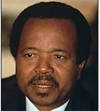Birth and Schooling
 Born on the 13 February 1933 in Mvomeka’a (Meyomessala Sub-Division, Dja et Lobo Division, South Province), of the late Etienne Mvondo Assam and late Mrs Mvondo nee Anastasie Eyenga Elle.
Born on the 13 February 1933 in Mvomeka’a (Meyomessala Sub-Division, Dja et Lobo Division, South Province), of the late Etienne Mvondo Assam and late Mrs Mvondo nee Anastasie Eyenga Elle.
- First school Leaving Certificate: June 1948 in Nden Catholic Mission school.
- Saint Tharcissus Vocational Orientation School, Edea (1948-1950).
- Saint Joseph Minor Seminary, Akono (1950-1954).
- B.E.P.C, June 1953.
- Lycee General LECLERC (1954-1956).
- Baccalaureate, Part I: 1955.
- Baccalaureate, Part II (specialization: Philosophy): June 1956.
- Lycee Louis le Grand, Paris.
- Universite de la Sorbne, Paris : Faculty of Law.
- Institute of political studies, Paris
- Institut des Hautes Etudes d ‘ Outre-Mer, Paris.
Degrees: Degree in public Law, Diploma from the Institute of political studies Paris, Post graduate diploma in Public Law.
Career
- Charge de Mission at the presidency of the Republic; October 1962.
- Director of the cabinet of the Minister of National Education; January 1964.
- Secretary General of the Ministry of National Education, July 1965.
- Minister Secretary General of the Presidency of the Republic; June 1970.
- Prime minister 30 June 1975.
- Prime Minister, successor of the President of the Republic in case of vacancy by virtue of Law number 79/02 of June 1979 to amend the constitution.
- He became president of the Republic the following the resignation of the former President on 6 November 1982 (constitutional succession). At his inauguration, he centered his action on the democratization of the political life, rigor in management, the moralization of behavior and the strengthening of international cooperation.
- Elected President of Cameroon National Union on the 14 September 1983.
- Elected president of the Republic on 14 January 1984, re-elected on 24 April 1988 (first presidential election through direct universal suffrage, with several candidatures in Cameroon).
- Elected President of the Cameroon People’s Democratic Movement( CPDM) after transformation of the CNU into the CPDM on 24 March 1985 in Bamenda.
By promulgating the law on Associations and political parties on 19 December 1990, Mr. Paul Biya restored multipartism in Cameroon (since 1st September 1966, the country had been under a de facto one-party system). Today, nearly 168 political parties have been legalized.
The CPDM gained an absolute majority at the legislative elections of March 1997 and June 2002 and its candidate won the presidential election of October 1997. Regardless to those victories, the president of the Republic chose to form a cross-party government. Three parties are represented in the government: the CPDM, UNDP and UPC. Seven parties are represented at the National Assembly: the CPDM, UNDP, SDF, UPC, UDC, MLJD and MDR.
Family Life
Mr. Paul Biya is married to Chantal Pulcherie Biya. He has three children: Frank Biya, Paul Biya Jr and Anastasie Brenda Biya Eyenga.
Honorary Distinctions
Mr Paul Biya is a holder of several decorations and honorary distinctions, amongst which are:
- Grand Master of the National Orders (Republic of Cameroon)
- Grand Cross of the Legion of Honor (French Republic)
- Great Commander of the Medal of St-George (UK and Ireland)
- Grand Cross, special class (Federal Republic of Germany)
- Grand Collier of the Order of Ouissam Mohammadi (Kingdom of Morocco)
- Great Commander of the Order of Niger (Federal Republic of Nigeria)
- Grand Cross of the Order of Merit (Republic of Senegal)
- Grand Cross of the National Order of Chad.
- Commander of the National order of Tunisia.
- Doctor Honoris Causa from the University of Maryland Eastern Shore, USA.
- Honorary Professor of the University of Beijing, People’s Republic of China.
- Laureate of the CEPS Award, 1998.
- Grand Collare dell ordinaire Piano, Vatican.
Publication
Mr, Paul Biya is the author of a political essay entitled Communal Liberalism, Macmillan Publishers Ltd, London.
Main achievements
Political:
- Restoration of multipartism with more than 168 legalized parties today.
- Setting up of the Anticorruption National Committee
- Abolition of administrative censorship of the press.
- Creation of the post of prime Minister, head of Government before 1991
- Admission of Cameroon into the Common Wealth of Nations and the Francophonie.
- Organization of the 32nd Summit of OAU in Yaounde.
Economic:
Rehabilitation of the entire sector; (restructuring, privatization or liquidation of public and semi public companies, liberalization of the agricultural sector)
Extracts from Civil Cabinet, Presidency of the Republic
Read about President Amadou Ahidjo

